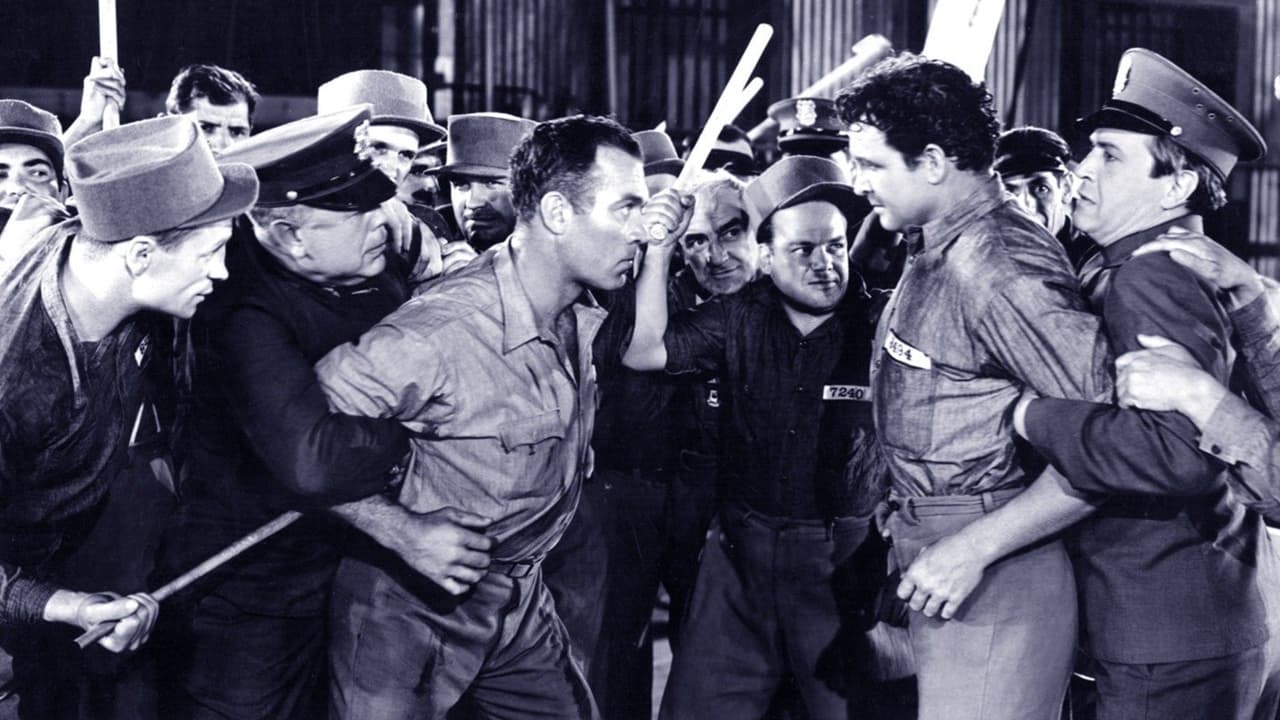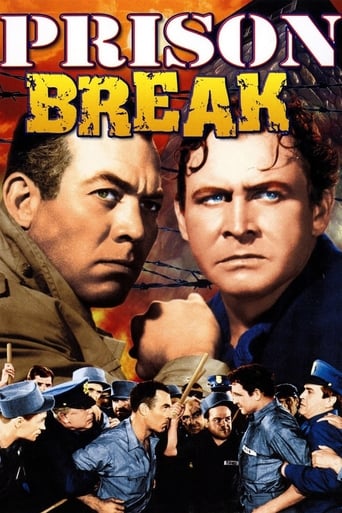

Moderately decent B drama about a hard working fisherman wrongly accused of murder who ends up in prison, gets a parole, which means jack squat when he tries to find a job. Barton MacLane isn't traditional leading man material, but kept getting leads in B's throughout the late 1930's into the mid 1940's. Sort of a second choice to roles that didn't go to Charles Bickford, he's a dependable character actor who rose above supporting roles. He's supported by Glenda Farrell, aka Torchy Blane, playing his devoted fiancé who stands by him even though her abusive father and brute brother vow to keep them apart. It's fast moving and truthful, but just one of many on the same subject. Good waterfront scenery and a believable prison break are the highlights. When MacLane tries to take a job out of the country and is reminded by his parole officer that he's not allowed to leave the state, all I could say is duh, wondering why the writers thought that it would be believable for him to even try. Minor complaint, but it was just too obvious to overlook.
... View MoreDirector Arthur Lubin's "Prison Break" is a sophisticated but formulaic incarceration saga about that doesn't violate the rigorous dictates of the Hays Office, a.k.a., the Production Code Administration. The Production Code Administration (PCA) censored Hollywood movies from 1930 to 1968 according to a rule book of sorts known as the 'production code.' Sometimes, the PCA convinces the studios not to produce certain films based on the subject matter. Lubin's glimpse at the unsavory life behind-prison-walls and the heartless justice system isn't business as usual. Prison movies have always been popular. Typically, the protagonist was a convict who suffered at the hands of the system until he was an undercover cop. The PCA said that all legal institutions had no flaws in their constitution. When Hollywood exposed the flaws of the prison system in "I Am a Prisoner on a Chain Gang" (1932), the blame fell on individuals abusing the system rather than the system itself. Often, the Hays Office allowed these flaws because they represented anomalous behavior. In "Prison Break," the integrity of our hero is untainted from the start; he shoulders the blame for a crime he didn't commit. Afterward, to his chagrin, he discovers the cruel attitude that the system takes to convicts. Inevitably, all prison movies are about a plan to break out. The titular event occurs about 40 minutes into this above-average 72-minute B-picture. Technically, the studio should have called it "Attempted Prison Break." As it turns out, nobody scales the walls, but an innocent inmate dies tragically in the attempt. Predictably, the message in this Universal Pictures' release is that 'crime doesn't pay.' Ironically, the virtuous protagonist lands behind bars because he embraces the principle of self-sacrifice. Self-sacrifice emerges as a clear theme, and it enhances the narrative because the hero is impeccably immaculate until the system taints him. Consequently, "Prison Break" doesn't indict the system because our hero's imprisonment isn't punishment as usual. The villains wield the system as a weapon against our self-sacrificial hero. Nevertheless, everything comes out of the wash, and the hero is redeemed and the villains castigated.Tuna boat skipper Joaquin Shannon (Barton MacLane of "High Sierra") wants to marry Jean Fenderson (Glenda Farrell of "Little Caesar") who loves him. Jean's little boy Jackie (Johnny Russell) adores Joaquin, too. Nevertheless, Jean's obstinate father, Old Man Fenderson (Victor Kilian of "The Ox-Bow Incident"), objects to her relationship with him on the basis of racism. He ridicules Joaquin as "a thieving Portuguese who hides behind an Irish name." Jean's shady brother Joe (Edward Pawley of "G-Men") supports their father's sentiments about Joaquin. "Dad's right about him, sis, the guy's no good." The Old Man assures Jean he run Joaquin off the waterfront. Jean gives her dad her walking papers. He threatens to take Jackie away from her, but she isn't afraid, especially since he didn't approve of her first marriage. Comparably, MacLane's blue-collar, Portuguese fisherman reminded me of Edward G. Robinson's Mike Mascarenhas in Howard Hawks' "Tiger Shark" made back in 1932. Lubin and scenarists Norton S. Parker, who wrote dozens of westerns, and "Rhubarb" scribe Dorothy Davenport utilize Joaquin's ethnic identity as a way to trigger tension. Mind you, Joaquin doesn't suffer the loss of a limb owing to a work-related accident. Nevertheless, Joaquin qualifies as a victim of the social system, too. During a marriage dinner, Chris Nelson (Edmund MacDonald of "Flying Tigers") gets too drunk, and Joaquin takes him outside. Dastardly Big Red Kincaid (Ward Bond of "The Searchers") walks into the bar during the marriage celebration. Moments before Chris staggers off toward the bar, Joe Fenderson steps up to the bar and flashes a wad of cash that Red doesn't miss. Meantime, Joaquin leaves Chris outside to sober up. Joe see Joaquin, has words with him, and they fight. Joaquin is restrained while Joe leaves. Red follows Joe outside and stabs him to death. Chris staggers up to Red and Red knows him unconscious. Joaquin finds Chris. Joaquin takes the blame to shield his future brother-in-law, Maria's Bridegroom, from being arrested. Joaquin draws a one to ten year stretch in San Quentin Penitentiary for this manslaughter charge. It takes Joaquin 19 minutes to wind up in prison. Jean waits for him, and eventually Joaquin gets paroled. At the same time, he doesn't know that Red murdered Joe until the final few minutes of this melodrama. Unfortunately, parole prevents Joaquin from plying the trade that he knows best. Later, Joaquin and Red have a knuckle-bruising brawl and our hero triumphs over Red. Red spent his time in prison, making life miserable for an abject Joaquin who has sworn to not stick his neck out and get in trouble. Red baits and frames Joaquin repeatedly, which turns the parole board initially against Joaquin and adds years to his sentence. After Joaquin foils Red's armed prison escape, our hero gets a three year parole, but the system appears to work against him.
... View MoreFrom 1937 through 1939, Barton MacLane and Glenda Farrell made seven Torchy Blaine films together--he as the police lieutenant and Farrell as Torchy, a crime-solving reporter. During this same period, the pair made this film at Universal, not at their usual Warner Brothers home.While "Prison Break" is clearly a B-movie with a modest budget and cast, it is a dandy film--and a nice chance for MacLane to prove he was a very good actor and could play characters other than baddies and cops. It begins with Joaquin (MacLane) working on a tuna boat and planning on marrying his sweetie (Farrell). At the same time, his buddy is planning on marrying Joaquin's sister and all looks great. However, when a man is killed, Joaquin takes the blame in order to help this friend--and ends up in prison. Things get worse when the same guy (Ward Bond) committed the murder is soon admitted to the same prison--and he's aching for a fight with Joaquin. Although Joaquin cannot help it, this fight and future fights against this thug serve to increase his sentence and it looks like he'll never get out at this rate! What's to become of nice-guy Joaquin? See the picture and find out for yourself--as there is a lot more to this film.The best thing about this film is MacLane--his acting was quite good. Additionally, while the story has some tough to believe coincidences, the film is enjoyable throughout. Plus, it has some reasonable criticisms of prisons and the parole system--ways that they might serve to make a guy who can be rehabilitated into a hardened criminal.
... View MoreI found this movie well made considering the era it was made in, probably on a shoestring budget. It does a very good job of conveying the difficulties anyone with a criminal record or down on their luck, justly or otherwise has, in staying out of trouble.The lead character is portrayed with credibility & it is easy to understand the complex situations he becomes involved in, encouraging empathy from unbiased viewers observing his plight. In fact, he has a greater integrity surely, than a great many who always steer the favourable side of shady deals. And amongst it all, he finds himself up against other inmates, prison officers & prospective employers, to mention just a few. He is supported & consoled only by his sympathetic romantic interest. The settings & bureaucratic nightmare he finds himself in, in & outside of prison, are sadly all too applicable to the more modern world scenarios about us, as back in the era of this movie made in the aftermath of the tough realities of the Depression years.But this "Prison Break" succeeds in being entertaining as well as informative & insightful. It is well worth a view!
... View More